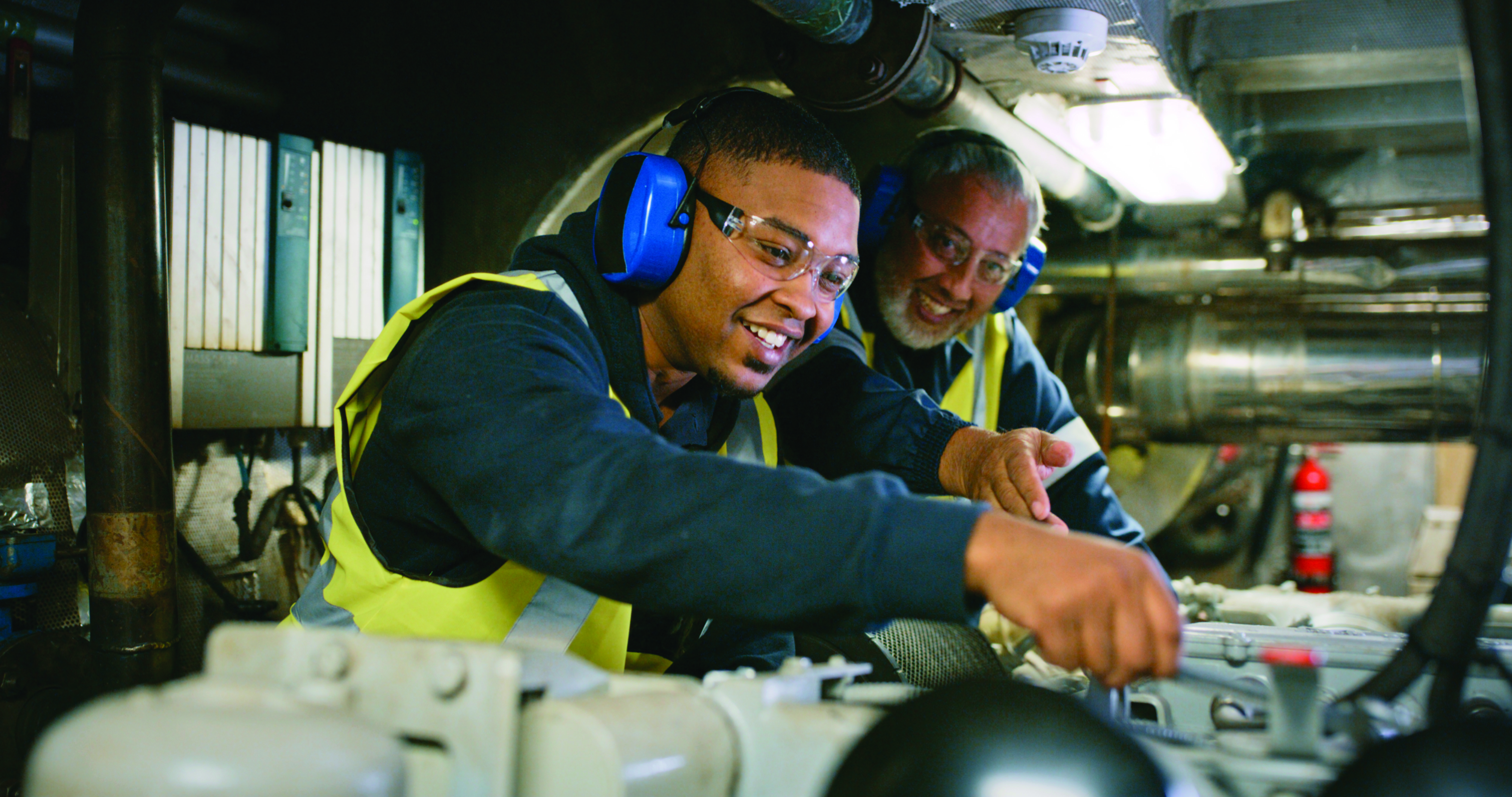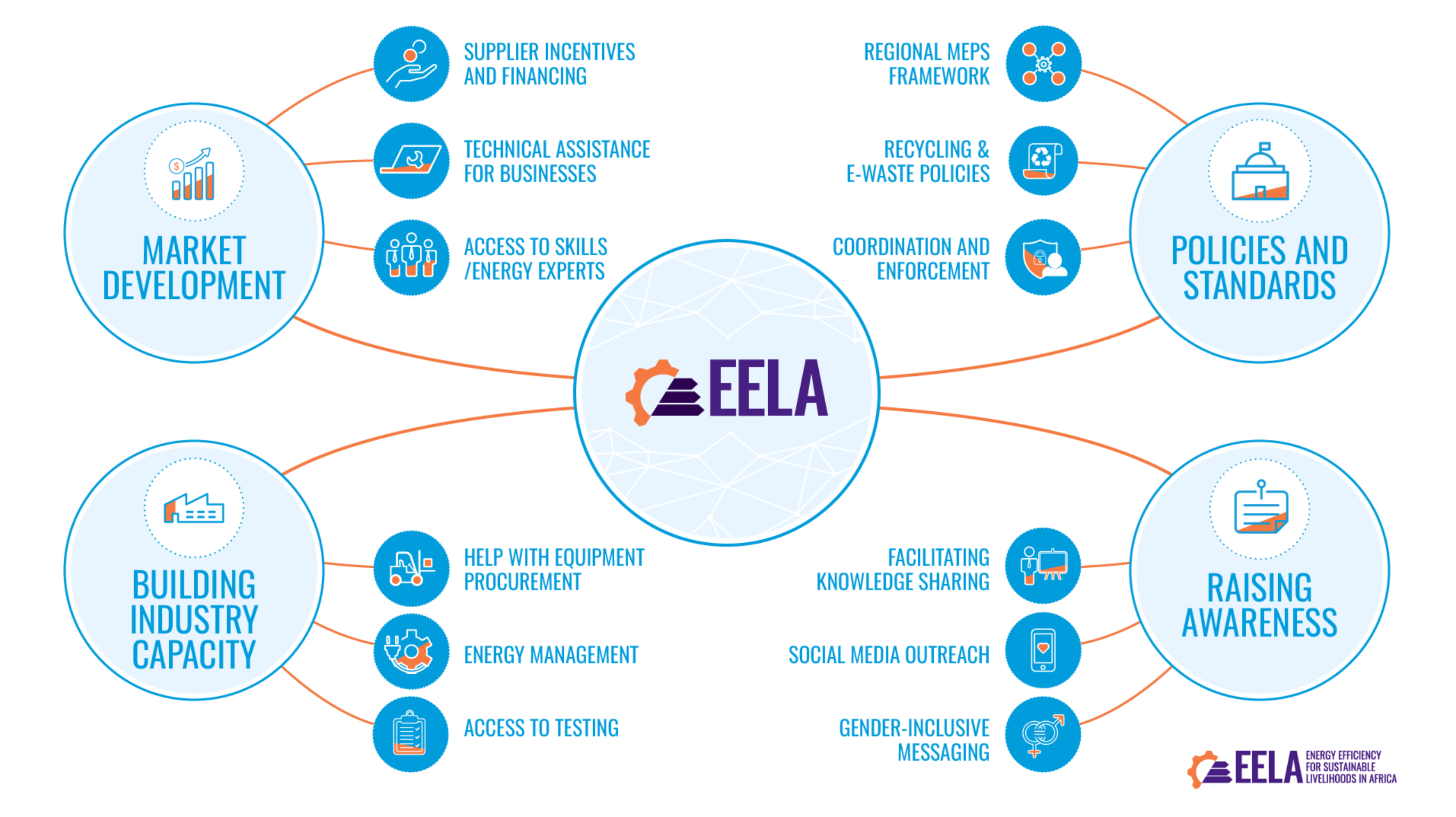
OUR APPROACH TO CHANGE
DRIVING MARKET TRANSFORMATION FOR SUSTAINABLE ENERGY SOLUTIONS
EELA implements a comprehensive strategy to address the systemic barriers preventing widespread adoption of energy efficiency across Africa. Our work in industry goes to enhancing energy access and reliability by reducing grid strain from inefficient appliances and industrial equipment, ensuring stable power for key sectors.
Our integrated approach combines four interconnected pillars: policy frameworks, economic drivers, market incentives, and awareness building. By addressing both supply and demand sides of the energy ecosystem, we create lasting market transformation that improves how energy is produced, distributed, and consumed.


MARKET INCENTIVES
EELA works with both private and public sector actors to unlock investment in high-performance energy-efficient products, appliances, and industrial technologies. Our approach includes:
- Industry Clean-Tech Platform (ICTP): A one-stop shop in partner countries that facilitates private sector investments for sustainable energy interventions in industries. The platform creates demand for low carbon technologies and solutions, facilitates technology transfer, and improves access to financing through partnerships with the financial sector.
- Energy Service Companies (ESCOs): Our work addresses challenges in financing ESCOs by engaging with financial institutions to improve accessibility of financing for ESCO business models, while providing technical assistance and co-financing for pilot projects. We also work with ESCOs to enhance policy and regulatory frameworks and raise awareness for this work.
- Supply Chain Development: Supply chain and market studies help us understand the markets for on-grid and off-grid lighting, refrigerating appliances, and productive-use appliances, enabling more effective interventions throughout the value chain.
- Technical Infrastructure: We strengthen appliance testing and monitoring through regional laboratories and deploy portable equipment with trained personnel to ensure product quality and compliance.
By supporting applications like off-grid cooling and piloting clean-tech platforms for low-carbon industrial growth, we demonstrate how energy efficiency businesses can thrive in African markets. These market development activities help address both supply and demand sides, ensuring that energy-efficient solutions become the natural economic choice for households and businesses.

POLICIES AND REGULATIONS
In collaboration with Governments and industry bodies, EELA supports harmonized Minimum Energy Performance Standards (MEPS), policy implementation, and compliance monitoring. Focus areas include public procurement guidelines, e-waste recycling, and gender-responsive policy design – all critical components of energy policies for sustainable development across the continent.
Effective policies and regulations create the essential foundation for sustainable energy transitions. EELA works at multiple levels to develop supportive regulatory frameworks that encourage efficiency investments and ensure quality standards in the market including:
- Supporting Governments to develop comprehensive energy efficiency strategies
- Harmonizing standards across regional economic communities to facilitate trade
- Strengthening enforcement capacity through training and institutional support
- Integrating energy efficiency into climate action plans and National Determined Contributions (NDCs)
- Developing regulatory frameworks that incentivize private sector investment

CREATING ECONOMIC DRIVERS FOR CHANGE
Through strategic financial mechanisms and business model innovation, EELA makes energy efficiency economically attractive for businesses, consumers, and investors.
Our approach includes:
- Facilitating access to affordable financing for energy-efficient equipment upgrades
- Developing pay-as-you-save models that eliminate upfront cost barriers
- Creating market aggregation mechanisms to achieve economies of scale
- Supporting local manufacturing of energy-efficient appliances and products
- Establishing quality assurance frameworks that build consumer confidence
Our work focuses on removing the initial cost barriers that often prevent adoption of efficient technologies while demonstrating the long-term economic benefits of improved energy performance. By supporting local manufacturing of energy-efficient products and establishing quality assurance frameworks, we build consumer confidence while creating local economic opportunities.

BUILDING ENABLING POLICY ENVIRONMENTS
Effective policies and regulations create the essential foundation for sustainable energy transitions. EELA works at multiple levels to develop supportive regulatory frameworks that encourage efficiency investments and ensure quality standards in the market including:
- Supporting Governments to develop comprehensive energy efficiency strategies
- Harmonizing standards across regional economic communities to facilitate trade
- Strengthening enforcement capacity through training and institutional support
- Integrating energy efficiency into climate action plans and National Determined Contributions (NDCs)
- Developing regulatory frameworks that incentivize private sector investment

RAISING AWARENESS
EELA's campaigns across digital platforms, publications and participation in global events raise awareness and advance knowledge, enhancing understanding for energy efficiency and driving demand for clean and energy-performing technologies. This helps consumers, policymakers and businesses to better understand the value of switching to energy efficient solutions, contributing to sustainable development across Africa.
Changing Behaviors and Perceptions
Awareness is the first step toward action.
Our initiatives highlight how energy efficiency improves access to high-quality, long-lasting products and technologies, prevents poor-performing products from entering markets, and makes efficient solutions more affordable and accessible. We emphasize how energy efficiency saves money on energy bills for both industries and households, reduces pressure on electrical grids, supports improved waste management practices and contributes to poverty reduction through enhanced access to sustainable energy with benefits for women and vulnerable populations.
Each awareness activity connects to broader development objectives, showing how energy efficiency contributes to energy security, enhanced industrial competitiveness, and decarbonization goals. By helping consumers, policymakers, and businesses understand the comprehensive value of energy-efficient technologies and practices, we create informed demand that drives sustainable market development across Africa. This activity is designed with clear objectives and measurable outcomes, ensuring that our communication efforts translate into tangible market shifts.